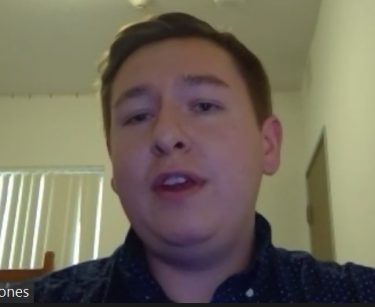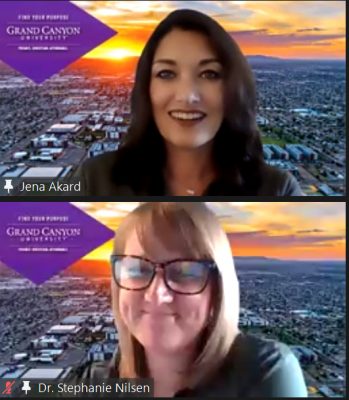
By Rick Vacek
GCU News Bureau
After listening to four Grand Canyon University students studying desert plants rattle off ten-dollar words and terms as fast as a bank teller counting a stack of bills, Tracey Lauterborn’s response was on the money.

“If we ever go on one of those survivor shows, we would want to be accompanied by Dr. Ramesh and his students,” the Colangelo College of Business instructor said Wednesday after the first afternoon of the fourth annual Kevin McClean Research Colloquium. “I will definitely look at my backyard differently now.”
Make no mistake, Dr. Ramesh Velupillaimani and his College of Science, Engineering and Technology students wowed the attendees – and the other presenters at the virtual gathering.
“Those kids were impressive, good gravy,” said one of those presenters, College of Education Professor Jena Akard. “I was like, ‘Could you say that word a little bit slower for me?’
“It’s just a testament to their professor. They’re doing a wonderful job. I was exhausted after that.”

Try having to summarize what they said, she was told.
“Just write, ‘These kids rock.’”
OK then! These kids rock – Hanwen Hu, Samuel Blackledge, Ajeane Cotton and Karson Rush-Briones.
Hu and Blackledge teamed up on a presentation evaluating the antibacterial efficacy of herbal extracts in combination with essential oils and also showed how plants can be barcoded.
Cotton examined whether a particular plant, desert broom, can be a healing agent.
Rush-Briones shared his research into which desert plants were most effective with which antibiotics.
The students made up one-third of the nine first-day presentations in the event sponsored by GCU’s Eta Chi chapter of Delta Mu Delta, the business honor society, and moderated by Lauterborn, fellow CCOB faculty members Dr. Moronke Oke and Dr. Helen Hammond, and several students. It continues at 3 p.m. Thursday (see schedule below).

The faculty presentations were equally stirring. Particularly apropos in light of the pandemic was Akard’s work with fellow College of Education faculty member Dr. Stephanie Nilsen on effectively schooling early childhood residency preservice teachers on online engagement strategies.
They began their work last March when COVID-19 led to the shutdown of in-person instruction. Akard saw it firsthand in her work with students and preservice teachers at Westwood Elementary School and was all in when Nilsen shared the benefits of reflective supervision – a teacher supporting the student instead of simply asserting knowledge.
“It’s been really interesting,” Akard said. “I feel like I can tell the kids, ‘This is what we need to engage these kids and get what you want.’ It’s really changed the way I do my teaching.”
Dances, workouts, at-home science experiments – they’re all part of Akard’s new teaching model. Teachers are all in the same boat and had to figure out how to paddle in unison.
“I’m not going to say I feel like a first-year teacher, but I definitely feel the weight of trying to figure it out,” she said. “One thing I think we have in common is we’re all figuring it out together. We all have a sense of being a novice, and I’m talking about everyone from my daughter’s teacher to the teachers I work with.
“It’s kind of fun to be back collectively in that space and learn together.”
Just like the learning at the colloquium. Below is a rundown of Wednesday’s presentations and the schedule for Thursday.
Warning to attendees: There’s one more student talking about the healing qualities of a desert plant, this time a cactus. Get ready for another sharp presentation – and more 10-dollar words.
WEDNESDAY SUMMARIES
Session 1
Dr. Maria Dulce Ruelas, Danielle Henderson, College of Nursing and Health Care Professions, “Emotional and Behavioral Responses from Public Health Students on COVID-19 Pandemic Declaration”
What they did: Addressed 181 public health students’ emotional responses and reactive behaviors to COVID-19, both as an outbreak and a pandemic.
What they found: Anxiety, fear and indifference were the top three emotional responses, but there was no significant difference between those who responded at the time of the outbreak and those who were polled after the pandemic was in full swing. Cleanliness habits such as washing hands and use of sanitizer went up dramatically.
****
Dr. Jason Hembree, Colangelo College of Business, “Exploring the Relationship Between Emotional Intelligence and Job Satisfaction in Human Resources”
What he did: Polled 127 human resources professionals in the southwest region of the U.S. to examine the relationship between emotional intelligence and four constructs – self-awareness, social awareness, relationship management and self-management.
What he found: Relationship management was the only area that showed a significant relationship to job satisfaction.
****
Dr. Julia Cronin-Gilmore, Bellevue University College of Business, “Exploring the Use of a Video Case Analysis to Increase Student Learning and Engagement”
What she did: Developed a storytelling case involving the marketing of a restaurant in the hope of enhancing student learning and keeping them engaged.
What she found: Students who used the storytelling case earned an average grade of 88 (B+), and students who used a textbook earned an average grade of 85 (B). More technology, support and training for faculty are needed, and there is a limited number of graduate textbooks with solid cases.
****
Hanwen Hu, Samuel Blackledge, Dr. Ramesh Velupillaimani, College of Science, Engineering and Technology, “Evaluation of Antibacterial Efficacy of Herbal Extracts in Combination with Essential Oils and DNA Barcoding of Medicinal Plants”
What they did: Evaluated antibacterial activity, isolated and characterized it and identified its properties in several plants. Also created barcode for plants.
What they found: The results were useful, and the barcoding can be used. Blackledge also said that there are many more plants to be studied; the benefits of these plants date to ancient times.
****
Ajeane Cotton, College of Science, Engineering and Technology, “Baccharis Sarothroides Extract Potentially Attenuates Chronic Anxiety and Infections”
What she did: Examined the relationship between antimicrobial infections and anxiety and how desert broom, an Asteraceae plant, can be a healing agent. Asteraceae can be found, for example, in chamomile tea, and plants of this nature have been used by native tribes for centuries to ease anxiety and physical pain.
What she found: The benefits of desert broom are worth investigating further.
****
Session 2
Dr. Breanna Naegeli, Honors College, “The Influence of Fan Engagement through Social Media on Performance Anxiety in Male NCAA Division I Athletes”
What she did: When the University of Alabama placekicker was inundated by vitriol, including death threats, on social media after missing three kicks in a championship game, Naegeli was curious about how college athletes dealt with social media and how it affected their performance. This is especially important given that, unlike professional and Olympic athletes, they do not receive as much formal training in that area, if they receive any at all.
What she found: Social media is a cultural norm for college athletes, and they intentionally seek out fan engagement – much like bystanders who can’t turn away from a serious auto accident. It can influence performance anxiety.
****
Dr. Merri Pedersen, Colangelo College of Business, “Engineering Leaders' Descriptions of Leadership Competencies in the Information Technology Field”
What she did: Polled 23 middle- to upper-level engineering managers, interviewing 14 of them, to find out how they utilized technical, human and conceptual skills.
What she found: Technical skills can be used without, as one interviewee put it, being considered the smartest person in the room. Human skills were cause for wariness because showing too much emotion can result in being less respected or not trusted. And conceptual skills are considered important in being able to see the big picture and solve problems.
****
Jena Akard, Dr. Stephanie Nilsen, College of Education, “Teaching Effective Online Engagement Strategies to Early Childhood Residency Preservice Teachers: Research, Implementation and Reflections”
What they did: Identified the challenges of teaching young students online (poor online infrastructure in many schools, complex home environments and the need for more teacher training). Then explored effective strategies for teaching online and how to teach those strategies to preservice teachers: mainly, keeping students engaged with meaningful activities that garner their attention.
What they found: Their research is still in process. They are reflecting on what works best for teaching preservice teachers how to teach young children online.
****
Karson Rush-Briones, College of Science, Engineering and Technology, “Synergistic Antibacterial Effects of Desert Plant Extracts and Antibiotics”
What he did: Combined various desert plant extracts with three different antibiotics (erythromycin, penicillin and tetracycline) to see which combinations were most effective.
What he found: All combinations showed positive results, particularly extracts with known anti-inflammatory properties.
****
THURSDAY SCHEDULE
GCU student noted with asterisk (*)
Session 3
3 p.m. – Welcome
3:10 p.m. – Dr. Randy Gibb, Dr. David Perkins, Colangelo College of Business, “Degraded Visual Conditions: Failing to Plan the Flight”
3:25 p.m. – Dr. Zachary Zeigler, College of Science, Engineering and Technology, “Effect of Sustained COVID-19 Guidelines on Eating Behaviors and Weight Gain”
3:40 p.m. – Dr. Marnie Davis, Colangelo College of Business, “Civic Engagement of Campus-based and Online Undergraduate Students: A Quantitative Causal Comparative Study”
3:55 p.m. – John Steele, Sarah Robertson, College of Humanities and Social Sciences, and Dr. Jean Mandernach, Center for Innovation in Research and Teaching, “Exploring Value Variations in Instructor Presence Techniques”
4:10 p.m. – Wrap-up
Session 4
4:30 p.m. – Welcome
4:40 p.m. – Greg Lucas, Dr. Shaunna Waltemeyer and Dr. Helen Hammond, Colangelo College of Business; Dr. Gary Cao, College of Humanities and Social Sciences; and Dr. Jean Mandernach, Center for Innovation in Research and Teaching; “The Value of Instructor Interactivity in the Online Classroom”
4:55 p.m. – Dr. Paul Danuser, College of Education, “Self-Efficacy and Servant Leadership through Tutoring and Mentoring: A Qualitative Case Study”
5:10 p.m. – Tracy Vasquez, Dusty Sanchez and Destini McGlothen, College of Education, “Creating Relevant and Specific Feedback for Teacher Candidates' Virtual Observations”
5:25 p.m. – April Sellers*, Center for Antimicrobial Products, “A Natural Cure in Cactus: Screening of Opuntia Species for Antimicrobial Activity”
5:40 p.m. – Wrap-up
****
Related content:
GCU Today: Student's deep dive highlights research colloquium
GCU Today: Colloquium showcases applicable research



































































